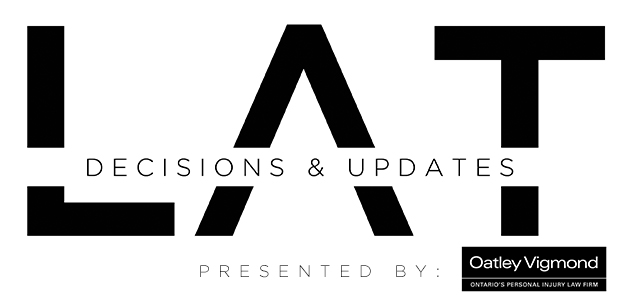V102 – Protecting Future Rights to Payment after Coverage Limits Have Exhausted

It seems to be with ever growing frequency that we see medical and rehabilitation benefits exhaust in the course of active accident benefits claims. For those who are seriously injured due to MVA, it can be extraordinarily difficult to recover within the non-catastrophic coverage limit of just $65,000. This is particularly problematic given the high threshold that must be met in order to achieve a catastrophic impairment designation and given the time that it otherwise takes to settle fault-based law suits.
When the coverage limits exhaust, people sometimes choose to terminate rehabilitation services. It is our experience, however, that many will instead choose to continue receiving services due to significant need for care. Such continuation may be achieved by clients either paying out of pocket for care or by establishing protected accounts with providers.
For those unfamiliar, a protected account is an irrevocable agreement in which the injured person and his or her therapist agree to continue to work together without immediate payment for service. The agreement is such that the account will eventually be paid when the claim settles. In some cases, we see these accounts paid prior to settlement if coverage limits are increased in the course of an open claim.
This issue of continued service beyond a coverage limit was reviewed in 16-001809, P.K. v. Cumis General Insurance Company. In this case, P.K. had been subjected to the minor injury coverage limit of just $3,500. Once she used the limit in full, Ms K. paid out of pocket for ongoing physical treatments; she incurred over $20,000 of expense. A year later, when a treatment plan was submitted and denied, an insurer examination led to the removal of the Minor Injury Guideline and, thus, an increase in her coverage limit was afforded (at the time being an increase to $50,000). A dispute subsequently arose with respect to whether the insurer was liable to reimburse Ms K. for her out of pocket expense from the prior period.
In short, Cumis rejected Ms K.’s expenses on the basis that no treatment plans had been submitted in advance of the expense being incurred. This denial was maintained even in despite of independent medical reports, and an insurer examination report, confirming that treatment was still warranted years later. To be clear, the denial did not consider whether the treatment was reasonable and necessary; the denial was based purely on the fact that expense had been incurred prior to submission of a treatment plan.
The decision on this issue was that the insurer was indeed not liable to reimburse the incurred expense. In rendering his decision, Adjudicator Sewrattin stated: “I appreciate deeply that the applicant incurred over $20,000 of expenses out of her own pocket. However, the applicant must submit an OCF-18 before she incurs an expense for a medical or rehabilitation benefit. This is required by the law…I have no ability to look past this requirement, regardless of what the party’s intentions may have been.”
It has often been suggested that an insurer is not liable to pay a medical or rehabilitation benefit if the expense is incurred without insurer approval. Notably, and as Adjudicator Sewrattin has confirmed, S.38(2) of the Statutory Accident Benefits Schedule states that the insurer is only not liable to pay a medical or rehabilitation benefit if the expense is incurred before the submission of a treatment and assessment plan.
When coverage limits increase, our experience has been that insurers will often pay reasonable and necessary expenses that were incurred during the exhausted coverage period. Such payments tend to occur regardless of whether treatment plans for the goods and services had been filed on claim. However, the above decision does highlight that insurers are not, in fact, liable to make such payments.
Considering this issue, submitting ongoing treatment plans on claims with exhausted coverage limits can be viewed as a good effort in order to protect one’s right to account payment at a later date. While the ongoing submissions may be tedious, and although denials on the basis of the exhausted limits will be expected, the plans will be further reviewed if ever coverage limits are later increased. It will be at that stage that the insurer will consider whether the goods and services proposed were reasonable and necessary when submitted. So long as the plans are approved, there may then be expectation of payment of retro-active expenses and accounts.
Official Decision:
16-001809, P.K. and CUMIS General Insurance
Questions and/or comments? We’d love to hear from you. Click here to send us an e-mail.
